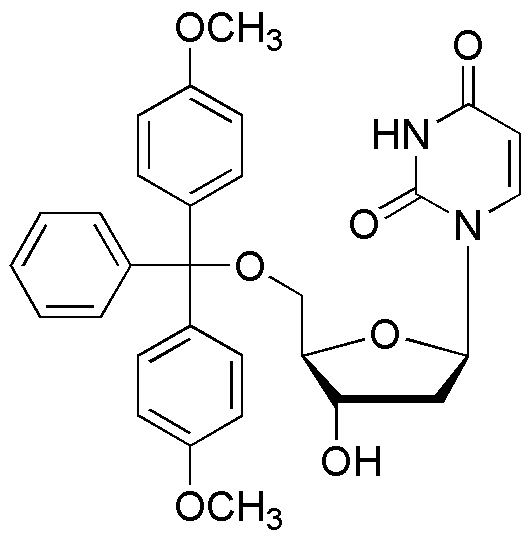5'-O-(4,4'-Dimethoxytrityl)-2'-deoxyuridine is widely utilized in research focused on:
- Nucleic Acid Synthesis: This compound serves as a key building block in the synthesis of oligonucleotides, facilitating the creation of DNA and RNA sequences for genetic research and therapeutic applications.
- Drug Development: It plays a crucial role in the development of nucleotide analogs, which can be used to design antiviral and anticancer drugs, enhancing the efficacy of treatments.
- Biotechnology: In the field of biotechnology, it is used in the production of modified nucleotides for applications such as gene editing and synthetic biology, allowing for precise modifications in genetic material.
- Diagnostic Tools: This compound is employed in the creation of probes and primers for PCR (Polymerase Chain Reaction), which are essential for various diagnostic tests in clinical laboratories.
- Research in Molecular Biology: It is utilized in studies involving DNA replication and repair mechanisms, providing insights into fundamental biological processes and potential therapeutic targets.
General Information
Properties
Safety and Regulations
Applications
5'-O-(4,4'-Dimethoxytrityl)-2'-deoxyuridine is widely utilized in research focused on:
- Nucleic Acid Synthesis: This compound serves as a key building block in the synthesis of oligonucleotides, facilitating the creation of DNA and RNA sequences for genetic research and therapeutic applications.
- Drug Development: It plays a crucial role in the development of nucleotide analogs, which can be used to design antiviral and anticancer drugs, enhancing the efficacy of treatments.
- Biotechnology: In the field of biotechnology, it is used in the production of modified nucleotides for applications such as gene editing and synthetic biology, allowing for precise modifications in genetic material.
- Diagnostic Tools: This compound is employed in the creation of probes and primers for PCR (Polymerase Chain Reaction), which are essential for various diagnostic tests in clinical laboratories.
- Research in Molecular Biology: It is utilized in studies involving DNA replication and repair mechanisms, providing insights into fundamental biological processes and potential therapeutic targets.
Documents
Safety Data Sheets (SDS)
The SDS provides comprehensive safety information on handling, storage, and disposal of the product.
Product Specification (PS)
The PS provides a comprehensive breakdown of the product’s properties, including chemical composition, physical state, purity, and storage requirements. It also details acceptable quality ranges and the product's intended applications.
Certificates of Analysis (COA)
Search for Certificates of Analysis (COA) by entering the products Lot Number. Lot and Batch Numbers can be found on a product’s label following the words ‘Lot’ or ‘Batch’.
Numéro de catalogue
Numéro de lot/série
Certificates Of Origin (COO)
This COO confirms the country where the product was manufactured, and also details the materials and components used in it and whether it is derived from natural, synthetic, or other specific sources. This certificate may be required for customs, trade, and regulatory compliance.
Numéro de catalogue
Numéro de lot/série
Safety Data Sheets (SDS)
The SDS provides comprehensive safety information on handling, storage, and disposal of the product.
DownloadProduct Specification (PS)
The PS provides a comprehensive breakdown of the product’s properties, including chemical composition, physical state, purity, and storage requirements. It also details acceptable quality ranges and the product's intended applications.
DownloadCertificates of Analysis (COA)
Search for Certificates of Analysis (COA) by entering the products Lot Number. Lot and Batch Numbers can be found on a product’s label following the words ‘Lot’ or ‘Batch’.
Numéro de catalogue
Numéro de lot/série
Certificates Of Origin (COO)
This COO confirms the country where the product was manufactured, and also details the materials and components used in it and whether it is derived from natural, synthetic, or other specific sources. This certificate may be required for customs, trade, and regulatory compliance.


